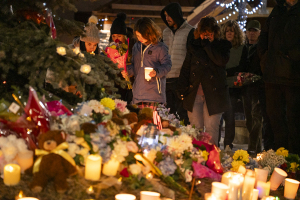Why domestic adoption is a global issue for the Church

This November, communities all across the United States have been celebrating National Adoption Month, an initiative to bring awareness about adoption. As Christians, we understand, both on an intellectual level and deeply in our hearts, that God’s desire for children is that they grow up in a safe and loving family. Our own adoption as His children stirs our hearts towards compassion and action on this topic — this is why so many Christian families make the decision to foster or adopt.
But this desire to care for children doesn’t just happen in the U.S. Families around the world are opening their hearts and their homes to vulnerable children in their own countries.
Children belong in families everywhere
God’s plan is for children to be part of a family, and Scripture and research align to show that family is indeed the best setting for a growing child. Yet residential care facilities, like orphanages and children’s homes, are too often the solution deemed necessary for vulnerable children. This is why Casa Viva was founded 18 years ago in Costa Rica. Casa Viva, the organization I work for, exists to support Costa Rican families through the process of foster care and adoption and offers holistic services to biological families in order to keep children out of residential care.
The importance of local church involvement
Local churches throughout Costa Rica are essential partners in this work. Following the biblical instruction to care for the fatherless, communities of faith have an opportunity to take on the responsibility to provide for and protect these children. We believe the Church can be the solution to strengthen vulnerable families, so that children aren’t at risk of being separated from their families unnecessarily.
And for the children who are not able to safely stay or be reunited with their biological families, the church can step in then as well. Whether it be to foster, adopt, or support the families and organizations who do, every member has a role to play in caring for vulnerable children.
Christians in the U.S. and Costa Rica share the same heart, which mirrors God’s heart for children to thrive in a family.
The beauty of domestic adoption
Marcos was seven months old when his family was no longer able to care for him. Casa Viva found a safe and loving foster family to take him in. However, after two years, it was determined that Marcos could not return to his biological family and he was declared “in abandonment” by Costa Rica’s child and family services. This process opened the door for adoption, and Marcos was matched with an adoptive family.
Casa Viva worked hard to ensure the transition would be as smooth as possible by becoming a resource for both the adoptive family and the foster family. By getting to know Marcos and through talking with the foster family, we helped the adoptive family with practical issues like providing his favorite foods and doing the activities he liked. And when deeper issues surfaced later on, we were there too — to support both Marcos and his family through those difficult times. Today, Marcos is a happy kindergartener, deeply loved by his family.
Families who have adopted know how challenging it can be; navigating trauma can affect the process of attachment and bonding. When these situations arise, we wrap around those families, just as we did for Marcos — providing them with training, education and a support group. It’s so important for families to know they aren’t alone on this journey.
Since our founding, Casa Viva has helped over 1,070 children be placed in families in Costa Rica, and that number is going to keep increasing. In the last few years, Costa Ricans have become very open to and are talking much more about adoption. It’s wonderful news because when children are adopted domestically, their cultural identity can stay intact. This offers continuity and connection, and one less hurdle to overcome in an already challenging situation. This work has been so significant to me personally that my husband and I have decided to adopt. We are eager to open our hearts and provide a stable and loving home for a child in need.
Children around the world belong in families, and the Church's involvement must continue to grow. Our work in Costa Rica is local. But as members of the body of Christ, the work to care for vulnerable children is global. Through your prayers and support of organizations doing the work to strengthen families, and those who provide alternative family care solutions, such as foster care and adoption, we can share this message of keeping children in families with others.
The local church can demonstrate to the world that God desires for children to be cared for in families.
Marcela Torres Leandro is the National Coordinator for Holistic Care for Casa Viva.



























